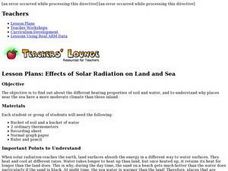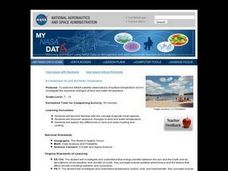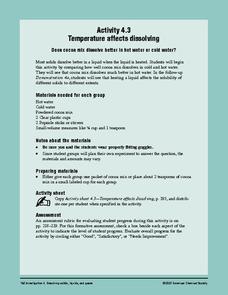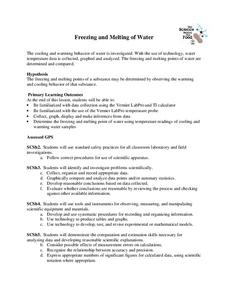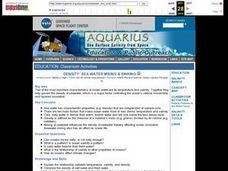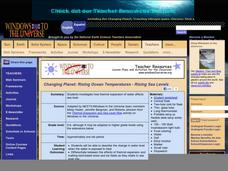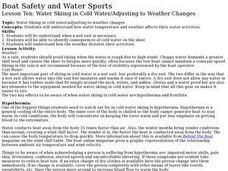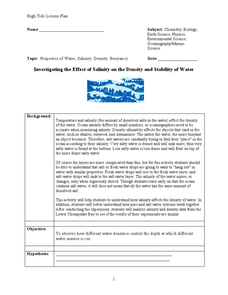Curated OER
The Effects of Temperature on Rate
High schoolers create predictions on what they believe happen to reaction rates when temperature is raised. They use hot, cold, and room temperature water for this experiment and observe the differences. They graph their observations and...
US Department of Energy
Effects of Solar Radiation on Land and Sea
Earth science enthusiasts experiment to compare the heating rates of soil and water. They relate their findings to the weather conditions near bodies of water. Consider also having middle schoolers measure the cooling rates to...
Curated OER
A Comparison of Land and Water Temperature
Students examine NASA satellite observations of surface temperature and investigate the seasonal changes of land and water temperature.
American Chemical Society
Temperature Affects Dissolving
Stir chocolate drink mix into hot and cold water to see if there is a difference in how quickly it dissolves. Number three in a six-instructional activity unit on dissolving, this installment investigates the effect of temperature. If...
Kenan Fellows
Making Connections with Water Quality
What's in your water? And, why is water quality so important? Enhance your class's level of water appreciation through a lesson that demonstrates the necessity of water quality. Environmental enthusiasts explore the EPA's Clean Water...
American Chemical Society
Temperature Affects Density
Different substances can have different densities, but can the same substance have different densities? Lesson explores the effect of temperature on the density of water. Extension idea connects the concept of how melting ice in lakes...
University of Georgia
Freezing and Melting of Water
Examine the behavior of energy as water freezes and melts. An engaging activity provides a hands-on experience to learners. Collaborative groups collect data and analyze the graphs of the temperature of water as it freezes and then...
K12 Reader
Measuring Temperature
Fahrenheit? Celsius? What's the difference, and where did these two temperature scales originate? Your pupils will learn all about these topics by reading the passage included here. After reading, individuals respond to five questions...
University of Waikato
Temperature, Salinity and Water Density
The difference between sinking and floating may be a little salt. Young experimenters analyze the effect of salt and temperature on the density of water. They use their results to predict the effect of climate change on ocean ecosystems.
Curated OER
Investigating Properties of Water: Temperature
Investigate how temperature affects the density of water and stratification that occurs in bodies of water when temperatures vary. Water of differing temperatures is given different colors to see the layers that form. The lesson is meant...
Curated OER
Sea Water Mixing and Sinking
Students investigate the role of temperature and salinity in determining seawater density. They use a Temperature-Salinity Diagram to examine the effects of mixing on density.
Nuffield Foundation
Investigating the Effect of Temperature on the Activity of Lipase
How does temperature affect lipase activity? Young scholars conduct an experiment to collect data on the interaction of lipase at different temperatures. They add lipase to a solution of milk, sodium carbonate, and phenolphthalein and...
American College of Sports Medicine
Selecting and Effectively Using Hydration for Fitness
How much water does your body lose during exercise? How much should you hydrate during and after exercise? Address the importance of hydration with your young athletes using this informative handout.
Space Awareness
Water is a Heat Sink
One of the key objectives of Europe's Copernicus Earth program is to monitor the temperatures of the oceans and seas on Earth. Young scholars learn the effects of different heat capacities through two experiments. These experiments...
Curated OER
Differences Between Ground and Air Temperatures
Students examine the differences between air temperature and ground temperature. For this investigative lesson students find NASA data on the Internet and use it to create a graph.
Curated OER
The Greenhouse Effect
Why does it get so hot inside of our cars in the summertime? The greenhouse effect! Lab groups experiment to see what happens to an ice cube enclosed in a jar and placed in sunlight as compared to an ice cube outside of the jar. They...
Curated OER
Temperatures and Reaction Rates
Students participate in a hands-on activity in which they observe the effect of temperature on the rate of chemical reactions. Using Alka Seltzer tablets in different temperatures of water, they record the amount of time it takes each...
Curated OER
Properties of Water with a Splash of Color
Students explore the properties of water. In this cross curriculum art and physical science lesson, students experiment with a variety of materials to demonstrate the cohesive forces and adhesion of water. Students create a water color...
Curated OER
Changing Planet: Rising Ocean Temperatures - Rising Sea Levels
As an anticipatory set, young environmental technicians watch a video about how ocean temperatures seem to be changing along with the global climate. They perform a laboratory demonstration with the purpose of observing what happens to...
NOAA
I Didn’t Do It…Did I?: Make Your Own Greenhouse Effect
How do greenhouse gases affect the climate on Earth? Pupils explore the concept by first building their own apparatuses to model the greenhouse effect. Then, they record data to measure temperature change and determine that the amount...
McAuliffe-Shepard Discovery Center
Global Warming in a Jar
This well-organized lab activity introduces earth science pupils to the greenhouse effect. They will set up two experiments to monitor temperatures in an open jar, a closed jar, and a closed jar containing water. Ideally, you would have...
Virginia Department of Education
Physical and Chemical Properties of Water
How can you effectively provide detailed concepts of water properties to your high school class in a way they find exciting and challenging at the same time? By letting them play, of course! Through a variety of experiments, pupils...
Curated OER
Boat Safety and Water Sports - Lesson 10 - Cold Water/Weather
Lesson 10 is part of a twenty-two lesson unit on boat safety and water sports. It focuses on how to handle cold water and cold weather when water skiing, as well as what to do if hypothermia or frostbite occur. Click on the resource link...
Curated OER
Investigating the Effect of Salinity on the Density and Stability of Water
Water with varying amounts of dissolved salt are dyed and then used to compare densities. The objective is to discover the effect of salinity, and therefore density, on ocean water on the stability of the ocean. Many branches of science...



